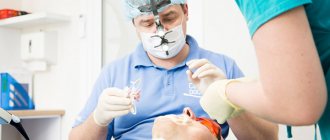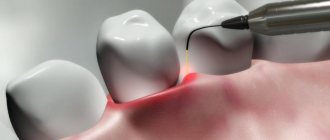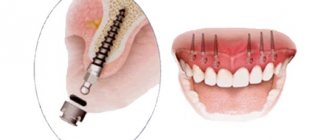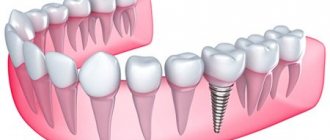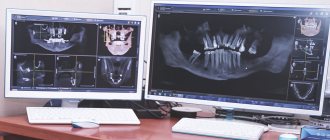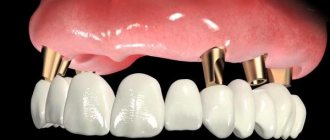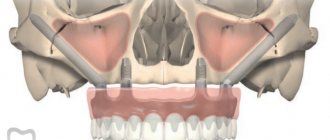How does the implantation process work?
Dental implant surgery is a surgical procedure. It allows you to replace bone tissue with artificial one and restore the function of the tooth. All questions about treatment, time intervals between operations and other important nuances are decided only by the attending physician. This is especially important during pregnancy.
Let's figure out how implantation occurs and what effect it has on the body of a pregnant woman and the fetus. The operation can be divided into 4 stages:
- Preparation;
- Surgical intervention;
- Microoperation;
- The final (orthopedic) stage.
Preparatory stage
At this stage, the woman is examined by a therapist and referred for tests. A general visual examination is also carried out, indications and contraindications for the operation are determined.
At the preparatory stage, it is necessary to understand whether the body is ready to install an implant and whether there is bone tissue atrophy. If atrophy is confirmed, then bone tissue is augmented before surgery. It is also necessary to perform sanitation and computed tomography, and conduct preparatory treatment of the oral cavity before surgery.
When restoring the upper row of teeth, a preliminary visit to an otolaryngologist is also mandatory.
Additionally, a pregnant woman needs to visit highly specialized specialists to analyze the condition of the body and fetus, and also if she has specific diseases. But it is best to postpone the procedure until the postpartum period.
Surgical intervention
At this stage, implants are introduced. The operation can last from half an hour to an hour. Its duration depends on the severity of the process and the number of teeth.
Before starting the operation, the doctor must disinfect the oral cavity and administer an anesthetic. At the request of the patient, both local and general anesthesia can be used. Sometimes a combination of the two types is used. Before prosthetics, you must make sure that anesthesia is safe for the fetus!
When using local anesthesia, the operation time is significantly reduced. In addition, it will be easier for the surgeon to do it. The use of drugs for local pain suppression allows the patient to avoid discomfort during surgery.
If a woman is afraid of dental procedures, she is additionally prescribed sedatives to help her calm down and get ready for implantation. The severity of sedation can be mild, moderate or severe.
Full anesthesia “in position” is extremely risky and is used in cases of major operations or the installation of two or more implants. It can be carried out by intravenous administration of the drug or by inhalation.
After all preparatory steps are completed, the surgeon prepares the bone tissue for implantation. He first cuts the gum and separates it from the periosteum, then, using special instruments (dental cutters), widens the incision for further insertion of an artificial root into it. The latter is screwed into the hole.
Before tightly suturing the wound, the doctor installs a temporary crown that will prevent tissue from growing into the inside of the implant.
10 days after the sutures are removed, microsurgery is performed. In its process, the plug is removed and an abutment is installed, the function of which is to connect two parts of the structure: a metal rod and the outer part of the implant - the tooth.
Orthopedic work
At this stage, impressions are taken of the female jaw, after which they are transferred to a specialist in creating prosthetics. The production time for dentures can vary and range from several days to weeks. It depends on the complexity of the work, the number of implants and adjustments to the individual characteristics of the patient’s jaw.
We must not forget that after the operation there is a rehabilitation period, which is about 5 months. It is at this time that the implant will fuse with the bone tissue.
During the rehabilitation period, it is necessary to adhere to a number of rules, carry out regular hygienic cleaning of the oral cavity, use antiseptic rinses and visit the dentist monthly. Solid food should not be consumed. The main task at this time is to monitor the condition of the oral cavity.
What is needed for successful implantation
In order for the embryo to successfully attach to the wall of the uterus and begin its development , certain conditions must be met:
- the expectant mother’s body must be healthy, and the walls of the uterus must contain all the necessary nutrients to support the development of the embryo;
- the thickness of the mucous membrane of the surface of the uterine walls should not exceed 13 mm;
- During the embryonic period, a woman’s body must produce a sufficient amount of the hormone progesterone, which delays the monthly cycle and promotes the development of the embryo.
If all conditions are met, if nothing unexpected happens, the embryo will be successfully implanted and a new life will begin to form.
Reasons for refusing surgery during pregnancy
Many doctors say that it is better to have a dental implant before pregnancy. This is due to some risks during the procedure, as well as possible complications after the operation. Dental implantation is not performed for pregnant women for the following reasons:
- Calcium deficiency in the body. This macroelement is a building material for bone formation, so during pregnancy it is very necessary for the fetus. If the expectant mother has a deficiency of this substance in her body, then it will be compensated for by the bone tissue of her teeth.
- Improper metabolism. During pregnancy, a woman's metabolism of proteins, carbohydrates, fats and minerals is completely restructured. The use of drugs and anesthesia can lead to imbalances and unpredictable consequences.
- Due to the double production of hormones, severe bleeding occurs in the gums, and blood circulation deteriorates.
- During pregnancy, the remineralizing properties of saliva decrease, which is why the enamel does not receive enough nutrients and minerals.
- The total amount of calcium and sulfates decreases, so the teeth do not receive enough of these components.
- In a woman’s body, the number of bacteria that contribute to the development of dental diseases increases.
Is emergency implantation possible if pregnancy has already occurred?
Theoretically, this is possible - usually in such cases, one-step implantation is used using gentle technology, without cutting the gum tissue. This may be necessary, for example, in cases of injury to the teeth and jawbone.
The main problem in such situations is the selection of gentle anesthesia (since it is unrealistic to carry out such a manipulation without anesthesia - this could result in very severe stress and even painful shock).
But if there are at least some options to do without implantation before childbirth (even at the cost of leaving the extracted tooth socket empty), then dentists from VivaDent advise choosing these options.
Possible risks to the body
Since a pregnant woman takes a significant part of the nutrients needed by the body from the fetus for its development, her general well-being and dental condition worsen. During gestation, there is no need to subject the body to any additional stress, as this can affect the health of the unborn baby.
But it is not always possible to refuse implantation during pregnancy, so the doctor, after examining the expectant mother, may decide to perform an operation. At the same time, he takes into account the following nuances:
- The metal rod that replaces the tooth root does not fuse well with the gums for a long time in pregnant women. To avoid complications, expectant mothers may have to use various medications.
- Fear factor. Any woman will experience fear of dental prosthetics during pregnancy. Although modern implants, medications and surgical methods make it possible to carry out implantation as efficiently as possible, it is impossible to take into account all the individual characteristics of a woman’s immune system.
- Before prosthetics, it may be necessary to undergo fluoroscopy, which is contraindicated for pregnant women. It poses a danger to the fetus, since the level of radiation received from it is quite high.
- The operation cannot be performed without anesthesia (local or general). It is highly undesirable to use it during pregnancy, as it can cause pathologies in the child.
- To engraft the implant, it is necessary to take antibiotics, which can have a negative effect on the development of the fetus.
- Dental prosthetics during pregnancy provokes an increase in the recovery period after surgery and increases the risk of infection. This is due to the weakening of the woman’s immunity.
- There is a possibility of unforeseen complications, since it is impossible to predict the body’s reaction to the introduction of a foreign body and taking medications.
The list of risks can be continued for a long time. It makes it possible to understand that the operation can negatively affect the development of the fetus. The worst negative consequences of prosthetics can be miscarriage and premature birth.
On what day after ovulation does embryo implantation occur?
The egg, after fertilization, already becomes a full-fledged embryo. It must begin to move towards the uterine cavity for pregnancy to occur. If it is attached to the wall of the uterus, then the process can be considered successful. Otherwise, the egg will be rejected by the female body as a foreign body, and the possible pregnancy will be terminated.
When does embryo implantation occur after ovulation? The embryo can remain in the uterus for approximately 1-2 weeks , depending on the ovulation period. During this time, it must attach to the wall of the uterus, otherwise it will die.
How long does it take to implant an embryo into the uterus? itself lasts two days , and then the development of the embryo begins. This period in medical practice is called embryonic. Its duration is 8 weeks. Although, according to some reports, the implantation period can last up to 20 weeks, that is, until the placental membrane is formed, protecting the fetus.
Important nuances
In emergency cases, the doctor can implant a tooth in a pregnant woman, but he will not make an incision in the gums, which will allow the patient not to prescribe antibacterial and anti-inflammatory therapy. But even in such a situation, there is a risk of developing inflammation due to the negative effects of anesthesia. Then an antibiotic will still have to be prescribed, which can have a bad effect on the development of the fetus.
If conception occurred after the completion of the operation during the rehabilitation period, then it makes no sense to take any action, since nothing can be changed. In this case, the expectant mother will not take medications harmful to the child’s health and will not be given anesthesia.
There are cases when a woman’s condition does not allow her to complete prosthetics. Then you need to listen to the advice of doctors and postpone the operation, since it can be completed at any time.
Dental implantation and pregnancy planning
If the pregnancy is truly planned, then there can be no talk of any planned dental implantation.
Therefore, below we will consider the situation with two other options:
- The woman did not know that she was in position and the implantation process began
- The woman became pregnant after the dental implantation process began.
What can you do in these cases, and what should you stop? It all depends on at what stage of implantation the woman became pregnant and how serious the implantation is.
Postpartum period and implantation
During the postpartum period, dental implantation cannot be performed if the woman is breastfeeding. Anti-inflammatory treatment is also unacceptable, since most medications have a detrimental effect on the quality of milk and the health of the child in general.
Dental implantation surgery can be done only 3 months after the baby stops breastfeeding. During this time, the woman’s body will be able to recover.
If the child is bottle-fed, then these prohibitions are irrelevant. But even in such a situation there are some nuances. It is prohibited to begin prosthetics immediately after childbirth, since the young mother’s body is too weakened to withstand the operation. Even a small cut can lead to serious consequences. Tests show this.
It is advisable to perform the operation a year after birth. During this period, the body will recover after a long period of bearing a child. It is better to place implants in the absence of contraindications and pregnancy.
We can conclude that it is not worth doing such operations during pregnancy, breastfeeding and during the first year after childbirth, as this will have a bad effect on the health of the child and mother. As for pregnancy after dental implantation, there are no special restrictions.
Pregnancy during implantation
Not every girl plans pregnancy long before it begins. Sometimes this happy moment comes completely suddenly and it may happen that it is at this time that the implantation procedure is carried out.
Much depends on the specific stage at which the treatment is currently located.
“If pregnancy is confirmed at the very initial stage of examination and testing, then you should simply reschedule the scheduled operation.”
It is much more difficult if pregnancy is confirmed already at the stage of implantation.
How to minimize negative consequences
Making sure that implantation does not affect the health of the unborn baby and her mother is the main task when working as an implantologist and the patient’s personal gynecologist. But the woman herself should have an idea of how to reduce the risks of complications and not harm the baby.
If pain does not decrease after implant placement, anesthetics can be used. This can only be done as prescribed by your doctor, since not all drugs are compatible with pregnancy.
It can be:
- Paracetamol;
- No-Shpa;
- Nurofen;
- Riabal;
- Ibuprofen;
- Papaverine and others.
If inflammatory processes are detected in the tissues where the implant was installed, with the permission of the doctor, you can take light antibiotics, which are characterized by the least negative impact on the health of the mother and the unborn baby.
Under no circumstances should you use the drugs yourself; the following can be especially dangerous:
- Tetracycline;
- Doxycycline.
These antibiotics are characterized by a high ability to penetrate the placenta and be deposited in the bone tissues of the fetus, while they are very toxic and have a negative effect on the liver.
There are also cephalosporins that are safe for the body and have virtually no effect on the fetus.
In case of severe stress, its consequences can be eliminated with the help of premedication - actions that are aimed at reducing anxiety and reducing the production of secretions by the glands. As prescribed by a specialist, these can be antihistamines or mild tranquilizers.
Oral care
After implantation, it is extremely important to carefully care for the oral cavity and the site where the post is installed. Particular attention should be paid to maintaining oral hygiene during pregnancy:
- It is necessary to clean your teeth and gums after every meal and sugary drinks.
- It is important to rinse your mouth with special solutions or herbal infusions.
- You should not use the same brush for a long period of time.
- You need to purchase toothpastes with a high fluoride content.
- It is better to supplement the care with the use of flossers - threads for cleaning teeth.
- It is important to monitor your diet and eat more foods rich in calcium.
Despite the fact that pregnancy detected at the time of implantation can be quite an unpleasant surprise, you should not despair. Moreover, this is a good sign that the implant is successfully implanted.
After childbirth
Is it possible to have implantation surgery immediately after giving birth? Here the opinions of professionals may differ. After all, the moment of breastfeeding is also a very important stage in the life of the baby.
“Many experts argue that a weakened body after pregnancy and calcium deficiency are reasons to postpone the operation for another year.”
Other doctors believe that implantation is possible even at the time of breastfeeding if the patient does not have any health problems and all preliminary tests are normal. However, it is worth remembering that when taking antibiotics, which may be needed if inflammation is detected at the implant site, breastfeeding will have to be stopped.
previous post
Dental implantation: how long does each stage take?
next post
It is important to know
Carrying a child takes a long time and there may be a need for emergency implantation.
In this case, at the discretion of the doctor, a minimally invasive operation without an incision can be performed , which allows you to do without antibacterial and anti-inflammatory therapy.
Despite this, there is still a risk of negative effects of anesthesia, and if inflammation occurs, which can lead to rejection, a course of antibiotics will be prescribed.
If pregnancy occurs during the period of osseointegration, that is, engraftment, there is no point in stopping the process, since nothing can be changed.
Installation of an abutment and permanent crown cannot harm the mother or unborn child because it does not require anesthesia and is not dangerous. However, there is still a need to coordinate all dental procedures with a gynecologist.
The presence of pregnancy can negatively affect the quality of implantation. The final restoration of the installation site of the system occurs within a year, during which the body, weakened by the immune system, is susceptible to harmful infections.
Therefore, you should prevent infection, and to detect it in a timely manner, visit the dentist more often and regularly.
It is important to carry out professional cleaning, remove plaque in a timely manner, prevent the development of pathogenic bacteria, and carefully observe oral hygiene.
Sometimes a woman’s general condition or medical conditions require postponing the final implantation process. In this case, you need to listen to the advice of doctors, because prosthetics can be completed at any time.
What functions does a temporary abutment perform and is its installation always required during implantation?
In this article, read about the intricacies of vertical and horizontal alveolar ridge augmentation.
Here https://zubovv.ru/implantatsiya/metodiki/iskusstvennaya-desna.html you will find fair reviews about artificial gums for prosthetics.
Self-determination of implantation
Measuring basal temperature will help determine possible implantation if such a procedure is carried out regularly, for 6 or more cycles. In the first phase of the cycle, the temperature in the rectum is low, about 36-36.5°C. At the moment of ovulation it sharply increases to 37°C. If the cell released from the ovary has been fertilized and the embryo has implanted into the wall of the uterus, upon implantation of the embryo, the basal temperature will briefly (literally within 1 day) decrease by 1-1.5°. This usually occurs 6-12 days after ovulation. This phenomenon is called implantation retraction and with great accuracy confirms the implantation of the embryo into the uterine wall.
In the following days, the temperature in the rectum will increase again and will remain within 37°C for the next 3 months. This is due to the high level of progesterone, which is produced by the corpus luteum of pregnancy.
If, after a sudden decrease in the second phase of the cycle, the temperature does not rise again, this will indicate a lack of consolidation of the embryo or termination of pregnancy.
Determining basal temperature is a fairly accurate way to recognize ovulation and embryo implantation. It is used not only in the routine practice of gynecologists, but also after in vitro fertilization. In the latter case, the information content of this method is lower, because the woman’s body is under the influence of hormones.
